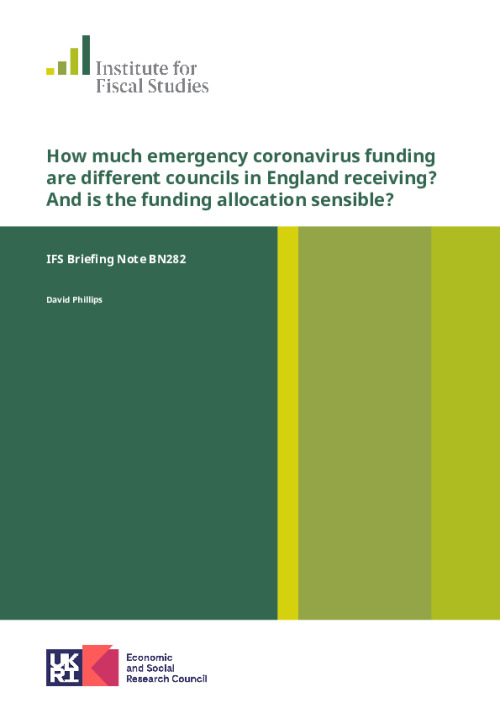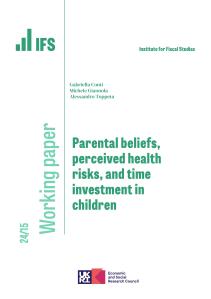The government is providing £1.6 billion to English councils to help them deal with additional spending pressures arising as a result of the coronavirus pandemic. This is being allocated according to assessments of spending needs in 2013–14, with the vast majority being allocated based on the assessments for adult social care – one of the services likely to be most affected by the pandemic.
This short report looks at how much different councils are set to receive, and at how sensible the government’s approach to allocating it across councils is. It finds big differences in allocations for different parts of the country; substantial variation in how both demographics and spending have changed over the seven years since the spending needs assessments used were initially calculated; and no relationship between funding allocations and currently confirmed coronavirus cases.
Looking in more detail:
- The amount allocated per resident ranges from £15 in Wokingham to £45 in Knowsley. In general, it is lowest in the Home Counties, especially to the west of London, and highest in parts of Merseyside, Teesside, Tyneside and inner London, as well as deprived seaside communities such as Blackpool and Torbay.
- Funding for deprived areas is higher not only in pounds-per-resident terms, but also measured as a percentage of spending on adult social care. For the ten councils with the most deprived populations, it amounts to an average of 10.7% of adult social care spending, compared with just 6.9% in the ten councils with the least deprivation. If actual spending rather than spending needs assessments from 2013–14 is a better predictor of how much additional funding councils will require to cope with the coronavirus crisis, less deprived areas may be more likely to struggle financially.
- The populations of different areas have also changed very differently over the last seven years, which is bound to have affected their spending needs. For example, while the populations of Blackpool and Kensington & Chelsea have fallen, the population of Tower Hamlets is estimated to have grown by 21.4%. And the numbers aged 80 or over – the group most at risk from coronavirus – have fallen by 7.2% in Barking & Dagenham, but have risen by 31.8% in Brent.
- Shire district councils, which are the lower tier of local government in rural areas, are set to receive an average of 45p per resident, or just 0.4% of their annual funding. This is unlikely to go far if the coronavirus crisis significantly impacts the services these councils are responsible for, such as housing, homelessness prevention, waste collection, environmental health, and cemeteries and crematoriums. In addition, gross income from on- and off-street parking amounts to 16% of their spending on local services, and is likely to fall significantly, putting further strain on their budgets.
- The coronavirus could also impact different councils in very different ways that have little to do with their general spending needs. As an indicator of this, at the time of writing, the prevalence rate is almost ten times greater across the five councils with the highest prevalence rate than across the five councils with the lowest prevalence rate (0.223% compared with 0.025%).
Taken together, the use of out-of-date and overly-general spending needs assessments may mean funding may not end up where it is ultimately needed most. Of course, accurately predicting in advance how much the coronavirus will affect councils in different parts of the country and providing funding accordingly is a near-impossible task. Given it wanted to provide additional funding quickly, the government has therefore had to make use of the rough proxies already available to it.
But there are other approaches it could have taken, and indeed could still take if further funding is deemed appropriate. Rather than try to allocate all of the funding in advance, it could loosen the rules to allow councils to borrow to fund day-to-day spending linked to the coronavirus pandemic, allowing them to respond rapidly in a manner they see fit. The government would then have the option of reimbursing councils at a later date once it has a better idea of what the impact of the coronavirus has been in different parts of the country and subject to proper financial safeguards.









